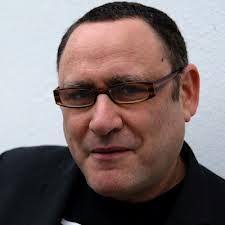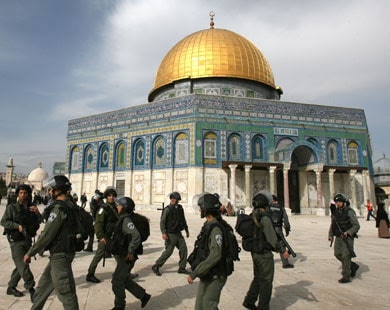Paul Larudee – How al-Aqsa Mosque Became a Refugee from Jerusalem
—
by Gilad Atzmon
Once upon a time, some people wanted to destroy al-Aqsa mosque in Jerusalem. So the mosque asked its friends, “Will you help save al-Aqsa?” We’re over a thousand years old and need your help.
“Not us,” said the Palestinians still living in Jerusalem. “We’re trying to keep our own houses and land.”
“Not us,” said the Palestinians with Israeli citizenship. “We’re already a persecuted minority in Israel.”
“Not us,” said the West Bank Palestinians. “We’re trying to save what we still have.”
“Not us,” said the Gaza residents. “We don’t want another Israeli pogrom.”
“Not us,” said the Palestinian Muslims. “We don’t want to be called terrorists.”
“Not us,” said the Palestinian Christians. “Our churches are being defaced and burned by the same people. We have our own problems.”
“Not us,” said the NGOs. “We only provide social services.”
“Not us,” said the diaspora Palestinians. “We have a hard enough time keeping people from noticing that we’re Palestinian.”
“Not us,” said the Western liberals. “We’re more concerned about keeping anti-Semites out of the movement.”
“Not us,” said the Western churches. “We have to keep good relations with our Jewish brothers and sisters.”
“Not us,” said the Arabs. “We’re busy with our own liberation movements.”
“Not us,” said the Muslim communities in non-Muslim countries. “We want our countries to think of us as good citizens.”
“Not us,” said the Muslims in Muslim countries. “We will denounce your persecutors but remain good Muslims by fasting, praying, doing pilgrimage, giving to the poor and declaring our faith, not by defending you.”
“Not us,” said the rest of the world. “We have to atone for the Holocaust.”
So al-Aqsa mosque waited for something to happen. And it did.
First, Israel expelled more than half of the people in Palestine and Jerusalem. Then Israel captured the rest of Palestine and Jerusalem. Then Israel began to expel more Muslim and Christian Palestinians. Then it began to prevent the remaining Palestinians from coming to Jerusalem.
Soon, fewer and fewer Palestinian Muslims could come to al-Aqsa and fewer Palestinian Christians to the Church of the Holy Sepulchre. And Israel sent Jews to start using al-Aqsa as their own.
Finally, Israel said, “The al-Aqsa mosque is empty and this is now a Jewish community, thanks to our Judaisation program. We don’t need a mosque, so we’re going to demolish al-Aqsa and replace it with a nice new Jewish temple. We don’t want any harm to come to you, so please pack your things and leave now, along with the rest of the Palestinians.
And that is how al-Aqsa mosque became a refugee like other Palestinians.

Gilad Atzmon is an Israeli-born British jazz saxophonist, novelist, political activist and writer.
Atzmon’s album Exile was BBC jazz album of the year in 2003. Playing over 100 dates a year,[4] he has been called “surely the hardest-gigging man in British jazz.” His albums, of which he has recorded nine to date, often explore the music of the Middle East and political themes. He has described himself as a “devoted political artist.” He supports the Palestinian right of return and the one-state solution in the Israeli-Palestinian conflict.
His criticisms of Zionism, Jewish identity, and Judaism, as well as his controversial views on The Holocaust and Jewish history have led to allegations of antisemitism from both Zionists and anti-Zionists. A profile in The Guardian in 2009 which described Atzmon as “one of London’s finest saxophonists” stated: “It is Atzmon’s blunt anti-Zionism rather than his music that has given him an international profile, particularly in the Arab world, where his essays are widely read.”
His new book The Wandering Who? is now availble at Amazon.com
ATTENTION READERS
We See The World From All Sides and Want YOU To Be Fully InformedIn fact, intentional disinformation is a disgraceful scourge in media today. So to assuage any possible errant incorrect information posted herein, we strongly encourage you to seek corroboration from other non-VT sources before forming an educated opinion.
About VT - Policies & Disclosures - Comment Policy





